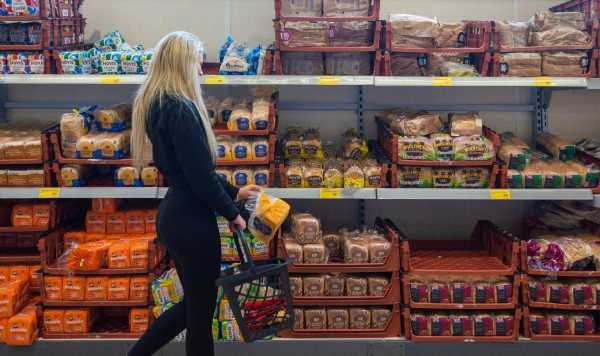Food shortages: Supermarkets to limit shoppers
We use your sign-up to provide content in ways you’ve consented to and to improve our understanding of you. This may include adverts from us and 3rd parties based on our understanding. You can unsubscribe at any time. More info
A year after the war in Ukraine began, the cost of putting food on the table in Europe is higher than ever before. However, out of a selection of peer countries, the prices charged by UK retailers are lower than most on the continent. Express.co.uk has crunched the numbers to see whose shopping trolleys cost the most to fill in 2023.
A number of factors compounded to make food more expensive across Europe over the past year. Successive pandemic waves caused logistical nightmares and resulted in widespread labour shortages in the agricultural sector.
Then Russia invaded Ukraine. Not only did this cut off exports from one of the world’s most important grain producers – the source of ten percent of all wheat and 15 percent of all corn – but it sent oil and gas prices skyrocketing.
This dragged up costs all along the food production supply chain – from fertilising crops to heating greenhouses to transporting goods
In 2023, as energy prices ease, overall inflation has started to drop. However, across most of Europe, food inflation is defying this trend.
The rate at which the price of food and non-alcoholic beverages in the UK is rising had increased for 17 consecutive months before falling slightly to 16.8 percent in January. Yet in the EU, food inflation hit a record 18.4 percent – the highest level since records began over 25 years ago.
This was highest of all in Hungary (48.2 percent) and lowest in Luxembourg (12.1 percent) – although nearby Turkey posted a staggering 70.1 percent and Switzerland just 5.8 percent.
Many of the most basic goods have been the ones increasing in price the most. Across the EU, bread was 20.3 percent more expensive than last January, milk 30.9 percent and eggs 30.4 percent.
Although these inflation rates have changed the picture dramatically over the past year. In many cases, the countries that have long paid very little for staple foods saw prices rise the most.
Express.co.uk has taken a look at a subset of ten European countries to see how Brits fare in comparison: Hungary, Poland, Germany, Belgium, Denmark, Greece, Spain, France, and Switzerland.
The cost of going shopping for the Swiss has long dwarfed that for those on the Continent surrounding it. In 2023, the average monthly cost of the minimum amount of food recommended for one person came to £564.
All staple food groups looked at were more expensive in Switzerland than anywhere else. The Swiss policy of autonomy above all entails a strong preference for domestic produce, depriving shoppers of cheaper imported alternatives.
Nestle, the world’s largest food and beverage conglomerate, is headquartered in the country, yet a 200g pot of Nescafe Gold De Luxe instant costs £12.93 – over £5 more than in Tesco.
The Economist’s Big Mac Index measures the price of Mcdonald’s’ cornerstone menu item in countries across the world to see how much locals are able to get for their money, otherwise known as their purchasing power.
At £5.61 a burger, life in Switzerland was found to be more expensive than anywhere else in the world.
DON’T MISS:
Boris breaks silence to savage Sunak’s new Brexit deal [BREAKING]
Isabel Oakeshott warns Matt Hancock not to pick ‘ugly fight’ [LATEST]
UK among top but rest of Europe slacking with NATO military funds [INSIGHT]
The horror kidnapping that shook a nation [REVEAL]
Food in France was found to be the second-most expensive of all in the group, with monthly basic shopping costs reaching £301.
According to the French statistics bureau, INSEE, the average price of a kilo of tomatoes in France was £3.43. The Office for National Statistics (ONS) puts the comparable retail price in the UK at £2.96.
Denmark ranked third, with a month’s shopping costing £296. Bananas in the Scandinavian country were found to be more pricey than anywhere else. The fruit costs roughly £0.24 a piece in Danish SPAR supermarkets, while just over £0.14 in British ASDAs.
The same basket of goods costs just £188 in the UK – cheaper than all countries considered except Hungary and Poland. A Big Mac in Hungarian currency comes to just £2.22, the best-value meal in Europe.
A half-litre bottle of Heineken beer costs £1.54 at Sainsbury’s, but leading Polish supermarket chain Biedronka has them on shelves for just £0.85.
Source: Read Full Article
-
‘I was a children’s key worker – now I pass on my skills through teaching in further education’ | The Sun
-
Celebrity gangster Dave Courtney 'took own life after cancer battle'
-
HIMARS incoming: Putin reels as Biden sends $1billion package of weapons to Ukraine
-
What to expect from Prince Harry's memoir 'Spare' out next Tuesday
-
Hamas beast who paraded murdered Shani Louk’s naked body through Gaza has been KILLED, claims top rabbi | The Sun

